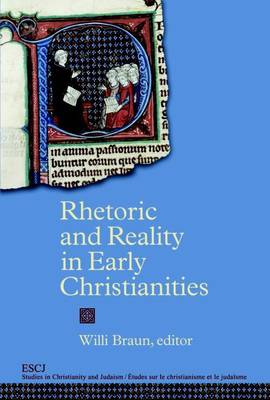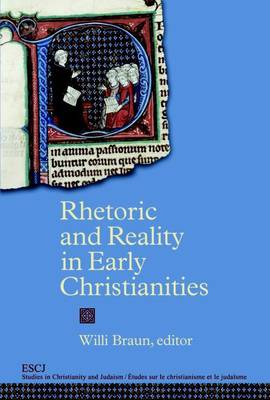
- Afhalen na 1 uur in een winkel met voorraad
- Gratis thuislevering in België vanaf € 30
- Ruim aanbod met 7 miljoen producten
- Afhalen na 1 uur in een winkel met voorraad
- Gratis thuislevering in België vanaf € 30
- Ruim aanbod met 7 miljoen producten
Rhetoric and Reality in Early Christianities
Omschrijving
One of the most pressing issues for scholars of religion concerns the role of persuasion in early Christianities and other religions in Greco-Roman antiquity. The essays in Rhetoric and Reality in Early Christianities explore questions about persuasion and its relationship to early Christianities. The contributors theorize about persuasion as the effect of verbal performances, such as argumentation in accordance with rules of rhetoric, or as a result of other types of performance: ritual, behavioural, or imagistic. They discuss the relationship between the verbal performance of rhetoric and other performative modes in generating, sustaining, and transmitting a persuasive form of religiosity.
The essays in this book cover a wide chronological range (from the first century to late antiquity) and diverse topical examples contribute to the collection's thematic centre: the relations among formalized and technical verbal performances (rhetoric, texts) and other forms of persuasive performances (ritual, practices), the social agendas that early Christians pursued by means of verbal, rhetorical performances, and the larger social context in which Christians and other religious groups competitively jockeyed to attract the minds and bodies of audiences in the Greco-Roman world.
Specificaties
Betrokkenen
- Uitgeverij:
Inhoud
- Aantal bladzijden:
- 276
- Taal:
- Engels
- Reeks:
Eigenschappen
- Productcode (EAN):
- 9780889204621
- Verschijningsdatum:
- 21/10/2005
- Uitvoering:
- Hardcover
- Formaat:
- Genaaid
- Afmetingen:
- 152 mm x 229 mm
- Gewicht:
- 557 g

Alleen bij Standaard Boekhandel
Beoordelingen
We publiceren alleen reviews die voldoen aan de voorwaarden voor reviews. Bekijk onze voorwaarden voor reviews.










